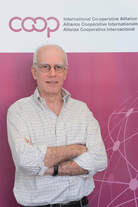|
O 33º CONGRESSO MUNDIAL
DE COOPERATIVAS SOBRE “APROFUNDAR A NOSSA IDENTIDADE COOPERATIVA” Seul, 1 a 3 de dezembro de 2021 Bruno Roelants Director-Geral da Aliança Cooperativa Internacional . . . . . . . . . . . . . . . . . . . . . . . . . . . . . . . . . . . . . . . . . . . . . . . . . . . . . . . . . . . . . . . . . . . . . De 1 a 3 de dezembro de 2021, a Aliança Cooperativa Internacional (ICA)(1) reunirá em Seul o 33º Congresso Cooperativo Mundial em torno do tema “Aprofundar a nossa Identidade Cooperativa”.(2)
Os Congressos Cooperativos Mundiais são acontecimentos muito excecionais: este será o 3º em 26 anos, após o 31º, realizado em Manchester em 1995, que comemorou os 100 anos da ACI, enquanto o 32º, realizado em 2012 também em Manchester, celebrou o Ano Internacional das Cooperativas lançado pelas Nações Unidas. O Congresso Cooperativo Mundial tem a missão estatutária de reunir não apenas membros da ACI, mas também membros cooperativos de todo o mundo. O iminente 33º Congresso Cooperativo Mundial estava originalmente agendado para dezembro de 2020, para comemorar os 125 anos da ACI e os 25 anos da Declaração de Identidade Cooperativa, que incorpora a última versão dos princípios cooperativos, mas teve de ser adiada por causa da pandemia. Em consonância com as grandes mudanças organizacionais que ocorreram na esteira da pandemia, o Congresso foi totalmente redesenhado como iniciativa híbrida e estará disponível para os participantes fisicamente em Seul e online, em 4 idiomas (inglês, espanhol, francês e coreano). Qual é a “identidade cooperativa” que este Congresso é chamado a aprofundar? Além do significado óbvio e imediato da identidade como algo com que nos identificamos, a expressão refere-se à já referida Declaração da ACI sobre a identidade cooperativa, finalizada no 31º Congresso Cooperativo Mundial em 1995, após muitos anos de consulta entre os membros da ACI em todo o mundo. Além da versão revista dos princípios cooperativos operacionais (cuja primeira versão foi elaborada já em 1844 por uma cooperativa de consumidores em Rochdale, nos subúrbios de Manchester), também contém a primeira definição de cooperativa aprovada no movimento cooperativo, bem como 10 valores subjacentes, constituindo esses três elementos (definição, valores subjacentes e princípios operacionais) um conjunto completo (necessário e suficiente) de padrões que definem o modelo de negócio cooperativo. Em poucas palavras, esses padrões definem:
Todos esses elementos e as suas implicações serão reexaminados em profundidade no próximo Congresso. Além disso, a pandemia de covid-19 confere forte valor agregado a este reexame, não só para as muitas cooperativas que estiveram diretamente na vanguarda durante a pandemia, como para as envolvidas na prestação de serviços de saúde e sociais, e para a resiliência que as cooperativas parecem mostrar de novo, como durante crises anteriores, mas também por causa do papel potencial das cooperativas durante o período de recuperação e reconstrução que se aproxima, e dentro de um repensar novo e profundo da economia e da sociedade que o período pós-pandemia deve logicamente trazer, e deve envolver as cooperativas como ator principal. Uma série de iniciativas e resultados pré-congresso, com a marca “Rumo ao Congresso Cooperativo Mundial”, está a ser lançada por diferentes entidades da rede ACI (regiões, sectores, membros, universidades), em torno do tema da identidade cooperativa. O Congresso será imediatamente antecedido de duas conferências preparatórias (28-30 de novembro), uma sobre investigação cooperativa e outra sobre direito cooperativo. O Congresso em si girará em torno de quatro temas sucessivos:
Com base na experiência prévia dentro da ACI cada vez que os elementos da identidade cooperativa foram examinados e aprofundados, o 33º Congresso Cooperativo Mundial deve gerar uma dinâmica pós-Congresso sobre a identidade cooperativa e, portanto, ser um ponto de partida em vez de um ponto de chegada. Este novo impulso é particularmente necessário num momento em que o mundo está prestes a viver o período pós-pandémico, com um profundo repensar de todas as ligações entre saúde, ambiente, desenvolvimento, paz e igualdade. 1. A ACI é a organização que atende, une e representa as cooperativas em todo o mundo. Estabelecido em 1895, tem 319 membros em 111 países. Os membros de cooperativas em todo o mundo são estimados em 1200 milhões, e as pessoas que trabalham em cooperativas, ou como produtores no âmbito de cooperativas, são estimadas em 10% da população empregada do mundo. 2. Veja https://icaworldcoopcongress.coop/ 3. https://www.ica.coop/en/media/library/ica-2020-2030-strategic-pla |
ENG
THE 33RD WORLD COOPERATIVE CONGRESS ON “DEEPENING OUR COOPERATIVE IDENTITY”
Seoul, 1-3 December 2021 Bruno Roelants Director-General of International Cooperative Alliance . . . . . . . . . . . . . . . . . . . . . . . . . . . . . . . . . . . . . . . . . . . . . . . . . . . . . . . . . . . . . . . . . . . . . On 1-3 December 2021, the International Cooperative Alliance (ICA)(1) will convene in Seoul the 33rd World Cooperative Congress around the theme of “Deepening our Cooperative Identity”.(2)
World Cooperative Congresses are very exceptional events: this one will be the 3rd one in 26 years, after the 31st, held in Manchester in 1995, which celebrated the 100 years of the ICA, while the 32nd, held in 2012 also in Manchester, celebrated the International Year of Cooperatives launched by the United Nations. The World Cooperative Congress has the statutory mission of gathering not only ICA members but also cooperative members from around the world. This incoming 33rd World Cooperative Congress was originally scheduled for December 2020, in order to celebrate both the 125 years of the ICA and the 25 years of the Statement on the Cooperative Identity which incorporates the last version of the cooperative principles, but it had to be postponed because of the pandemic. In keeping with the big organisational changes that have taken place in the wake of the pandemic, the Congress has now been fully redesigned as a hybrid event, and it will be available to participants both physically in Seoul and on line, in 4 languages (English, Spanish, French and Korean). What is the “cooperative identity” which this Congress is called to deepen? Beyond the obvious and immediate meaning of identity as something which one identifies with, the expression refers to the above-mentioned ICA Statement on the Cooperative Identity which was finalised at the 31st World Cooperative Congress in 1995, after many years of consultation among ICA members around the world. Apart from the revised version of the cooperative operational principles (whose first version were elaborated as early as 1844 by a consumer cooperative in the Manchester suburb of Rochdale), it also contains the first definition of cooperative approved from within the cooperative movement, as well as 10 underlying values, the three elements (definition, underlying values and operational principles) constituting a complete (both necessary and sufficient) set of standards defining the cooperative business model. In very few words, these standards define the following:
All these elements and their implication will be re-examined in depth in the incoming Congress. In addition, the COVID-19 pandemic provides a strong added value to this re-examination, not only for the many cooperatives that have been directly at the forefront during the pandemic such as those involved in health provision and social services, and for the resilience which cooperatives seem to once again be showing like during previous crises, but also because of cooperatives’ potential role during the incoming recovery and reconstruction period, and within the new and profound rethinking of the economy and society which the post-pandemic period should logically bring about, and should involve cooperatives as a major actor. A series of pre-Congress events and outputs, branded “Towards the World Cooperative Congress”, are presently being launched by different entities of the ICA network (regions, sectors, members, universities), around the theme of the cooperative identity. The Congress will be immediately preceded by two preparatory conferences (28-30 November), one on cooperative research and one on cooperative law. The Congress itself will hinge around four successive themes:
Based on previous experience within the ICA each time the elements of the cooperative identity have been examined and deepened, the 33rd World Cooperative Congress should generate a post-Congress dynamic on the cooperative identity, and thus be a point of departure rather than a point of arrival. This new impetus is particularly needed at a time when the world is about to live the post-pandemic period, with the in-depth rethinking of all the connexions between health, the environment, development, peace and equality. 1. The ICA is the organisation that serves, unites and represents cooperatives worldwide. Established in 1895, it presently has 319 members in 111 countries. Cooperative members around the world are estimated to be 1.2 billion members, and people working in cooperatives, or as producers in the framework of cooperatives, are estimated to be 10% of the employed population of the world. 2. See https://icaworldcoopcongress.coop/ 3. https://www.ica.coop/en/media/library/ica-2020-2030-strategic-plan |


